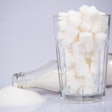Researchers are developing a protein-based sweetener that contains no sugar, is sweeter, and won't cause tooth decay, according to a press release from the Fraunhofer Institute for Molecular Biology and Applied Ecology in Germany.
Brazzein, a heat-stable sweetener from the African plant Pentadiplandra brazzeana, is being modified with the goal of creating a protein-based sweetener to replace sugar and other sugar alternatives in products, especially drinks, according to the press release.
"Since it is practically calorie-free, our modified Brazzein variant does not cause tooth decay and does not affect blood sugar levels," Dr. Stefan Rasche, a Fraunhofer scientist, said in the release.
Fraunhofer researchers and metaX - Institute for Diabetes and Candidum started the NovelSweets project to help reduce the sugar content in convenience products and beverages with the goal of cutting health problems associated with poor nutrition.
Their research is based on sweet-tasting proteins that occur naturally in some plants like brazzein and fruits and due to their structure and that dock very well to tongue receptors that people perceive as sweet. Researchers are developing protein variants based on brazzein's protein sequence.
Microbial fermentation is being used to optimize the protein's pH and temperature stability and improve their sweetening power and taste. In this biotechnology technique, the gene that codes for the sweet-tasting protein is introduced to yeast cells. Then they are multiplied in a bioreactor under controlled conditions so that large quantities of the proteins can be formed. Finally, the sweetener is available after it undergoes purification and drying, according to the release.
Brazzein, or X3, not only has almost no calories, contains no sugar, and tastes slightly like honey, but it's much sweeter. One gram of the protein-based sweetener is as sweet as nearly 22 lb of table sugar, according to the press release.
"We were able to develop an SP that is about 10,000 times sweeter than table sugar," Rasche said.
So far, the substitute has been added to beverages. Currently, metaX is testing the sweetener in a low-protein, cocoa-containing beverage powder. Before the approval process for the sweetener can start, the manufacturing process and further product validation measures will be optimized to unlock X3's full potential, according to the release.
"The innovative sweetener is a real sugar alternative," Rasche said.




















